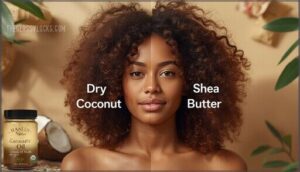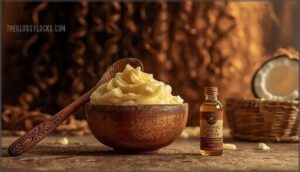This site is supported by our readers. We may earn a commission, at no cost to you, if you purchase through links.

Shea butter and coconut oil have earned their spots on bathroom shelves, but choosing between them isn’t as simple as grabbing the jar with the prettiest label. Each offers a distinct mix of fatty acids, vitamins, and moisture—yet their effects on hair texture and health can be worlds apart.
Understanding shea butter vs coconut oil for hair could mean the difference between frizz and smooth shine, especially when your hair’s needs are anything but ordinary.
Table Of Contents
- Key Takeaways
- Similarities and Differences Between Shea Butter and Coconut Oil
- Ideal Hair Types for Shea Butter and Coconut Oil
- How to Choose The Best Shea Butter and Coconut Oil for Your Hair
- Benefits of Shea Butter for Hair
- Disadvantages of Shea Butter for Hair
- Benefits of Coconut Oil for Hair
- Disadvantages of Coconut Oil for Hair
- Shea Butter Vs Coconut Oil for Hair: Which is Best?
- Recommended Product: Organic Shea Butter 500g
- Recommended Product: Maui Moisture Hair Mask
- Frequently Asked Questions (FAQs)
- Is shea butter better than coconut oil?
- Does shea butter dry out hair?
- What are the health benefits of shea butter and coconut oil?
- Should I use coconut oil or shea butter for my hair?
- Does shea butter grow hair?
- Is coconut oil good for your hair?
- What is the shelf life of Shea Butter and Coconut Oil?
- Can you mix shea butter and coconut oil together?
- How do you apply shea butter to hair?
- Does coconut oil affect hair color treatments?
- Conclusion
Key Takeaways
Shea butter works best for thick, curly hair by sealing in moisture and soothing the scalp, but it can cause buildup and block hydration in low porosity hair.
Coconut oil penetrates the hair shaft to reduce protein loss and add shine, making it ideal for fine or low porosity hair, though it may weigh strands down if overused.
Both ingredients offer vitamins and fatty acids that support hair growth and health, but their effects and textures differ significantly, so matching them to your hair type is key.
Mixing shea butter and coconut oil can balance moisture and strength, but always check for pure, organic products and adjust use to your hair’s needs.
Similarities and Differences Between Shea Butter and Coconut Oil
When you compare shea butter and coconut oil side by side, you’ll notice they share some key properties but differ in ways that matter for your hair. Understanding what makes them alike and where they part ways helps you pick the right one for your needs.
Let’s break down the similarities first, then look at how they differ.
Similarities
Both shea butter and coconut oil deliver powerful moisturizing properties that nourish your hair and scalp. These natural ingredients share several hair benefits, including their rich content of fatty acids and vitamins A and E that support healthy growth. You’ll find both used extensively in hair care ingredients across shampoos, conditioners, and styling products because of these shared advantages.
When comparing hair oils, both provide cosmetic uses that boost shine and manageability. Shea butter for hair offers a heavier, creamier consistency with about 40–55% oleic acid, while coconut oil for hair features a lighter texture rich in lauric acid at 45–53%. You’ll notice coconut oil melts at 24°C and spreads easily, whereas shea butter stays solid until 32–45°C. Both seal in hair moisture and shine, though they work differently—coconut oil penetrates your hair shaft to reduce protein loss, while shea butter forms a protective barrier on the surface. Understanding hair moisture retention is key to choosing the right product for your hair type.
Differences
Now, looking closer at differences, texture comparison stands out. You’ll find coconut oil for hair is lighter, melting quickly and absorbing fast—ideal for fine hair and scalp health. Shea butter for hair, with its heavier chemical makeup and earthy scent, suits thick, dry strands.
Moisturizing power varies by hair porosity and oils: coconut oil penetrates, while shea butter coats. Comparing hair oils means matching benefits of shea butter to your needs and watching for buildup if your hair is on the finer side. Understanding the natural skin benefits is essential for making an informed decision.
Ideal Hair Types for Shea Butter and Coconut Oil
Choosing between shea butter for hair and coconut oil for hair starts with knowing your hair type and porosity. Thick, curly textures—especially Type 3 or 4—hold onto moisture best with shea butter. Fine or low porosity hair usually fares better with coconut oil, which won’t weigh strands down. For example, if your scalp conditions include dryness or frizz, coconut oil can help. Consider these factors:
- Hair Porosity
- Curl Patterns
- Hair Texture
- Moisture Levels
How to Choose The Best Shea Butter and Coconut Oil for Your Hair
Now that you know your hair’s porosity and texture, picking the right Hair Oil Blends comes down to the details. You want Natural Ingredients that truly support hair growth and overall hair care. Always check Product Labels—pure shea butter should only list one ingredient, while coconut oil works best when it’s cold-pressed and organic. Don’t forget about Oil Quality; raw shea butter from West Africa and coconut oil sourced from Southeast Asia are trusted for purity.
For your reference, here’s what to look for:
- Ivory or pale yellow shea butter for potency
- Dark containers for coconut oil to preserve freshness
- Certified Organic or Fair Trade seals for authenticity
- Mild, nutty aroma for shea butter; gentle coconut scent for oil
Your hair deserves nothing less.
Benefits of Shea Butter for Hair
Regarding Shea Butter Benefits, you’ll notice a difference in hair moisturizing and overall hair health. This rich butter seals in moisture, reducing hair moisture loss by up to 80 percent.
It nourishes with vitamins A and E, supporting hair growth and follicle stimulation.
For scalp health, shea butter soothes irritation and fights inflammation, creating a healthy environment for your roots.
Over time, you’ll see stronger, shinier hair with better elasticity and less breakage.
Disadvantages of Shea Butter for Hair
While shea butter has its perks, it’s not perfect for every hair type or routine. There are a few drawbacks you should keep in mind before adding it to your regimen.
Let’s look at some common concerns you might encounter.
Can Prevent Water From Penetrating The Hair
Did you know shea butter forms a powerful Hair Barrier, acting almost like a Water Repellent shield? Its Occlusive Effects and Hair Sealing properties lock moisture in, but for low porosity hair, this can backfire.
The heavy Moisture Lock blocks water from entering, making hair hydration and manageability tougher. If your hair struggles to absorb moisture, be cautious.
Not Suitable for Those Who Co-wash
Co-wash limitations show up quickly when you introduce shea butter to your routine. Its dense, waxy texture has a tendency to cling to strands, leading to oil buildup issues and persistent hair residue problems.
For those with low porosity hair, product removal struggles become a regular headache, since co-washing alone can’t clear away the heavy barrier shea butter creates. Scalp irritation causes—like itching and breakouts—often follow.
Even coconut oil, while lighter, can leave limp roots and oily residue. If you rely on co-wash, these ingredients may force you to clarify more often, disrupting your hair’s moisture balance and curl pattern.
Strong Smell
Ever wondered why shea butter’s scent lingers long after you’ve washed your hair? Its earthy, nutty aroma comes from volatile compounds that persist for up to 48 hours, especially in warm weather. In a shea butter vs coconut oil comparison, coconut oil’s mild fragrance fades much faster.
Here’s what to keep in mind for odor control and scent preferences:
- Unrefined shea butter’s smell intensifies with freshness.
- Scent persistence is higher in humid environments.
- Fragrance chemistry changes with repeated heating.
- Blending with coconut oil improves aroma stability.
Benefits of Coconut Oil for Hair
If you’re searching for a multitasker in hair care, coconut oil produces outcomes that go far beyond shine. The secret lies in its unique fatty acids, which penetrate deeply to hydrate, repair, and protect each strand from the inside out.
For instance, regular Oil Therapy with coconut oil can reduce hair breakage by over 40%, restoring strength and resilience. It’s a practical choice for anyone aiming to boost Hair Growth or improve Scalp Health.
Coconut Benefits include taming frizz, defending against split ends, and fostering a healthy scalp microbiome. The lightweight texture ensures your hair won’t feel weighed down, making it ideal for fine or low porosity hair.
Here’s a quick comparison of coconut oil’s advantages:
| Benefit | Description |
|---|---|
| Hair Repair | Reduces breakage, split ends |
| Hair Growth | Sustains follicle health |
| Scalp Health | Antimicrobial, hydrates |
| Coconut Benefits | Adds shine, controls frizz |
Disadvantages of Coconut Oil for Hair
While coconut oil offers plenty of benefits, it’s not perfect for every hair type. Some drawbacks can show up, especially if you use it the wrong way. Here’s what you need to watch out for.
Heavy
Have you ever noticed your hair feeling heavier after using coconut oil? That’s not your imagination—coconut oil’s thick consistency and high saturated fat content can create a dense film on your strands. For fine or low-density hair, this extra Hair Weight leads to clumping and a greasy look.
Oil Buildup and Product Residue may linger, especially if you use more than your hair needs. Scalp Occlusion is another concern; excess coconut oil can trap heat and sebum, disrupting scalp balance.
If you’re aiming for light, bouncy hair or using a hair mask, consider how coconut oil’s richness may affect your results.
Can Lead to Dry Hair
If coconut oil weighs your hair down, it can also tip the scales toward dryness. For low porosity hair, the oil’s hydrophobic barrier blocks water, leading to Hair Dryness Causes like brittle strands and breakage. To maintain Moisture Balance and prevent Oil Buildup, consider these steps:
- Use clarifying shampoo to clear residue.
- Support scalp health for less hair shedding.
- Limit heavy oil applications.
- Alternate with hydrating treatments for Dryness Prevention.
This approach helps keep dry hair and hair breakage at bay.
Shea Butter Vs Coconut Oil for Hair: Which is Best?
Choosing between shea butter and coconut oil depends on your hair’s needs and texture. If you want more vitamins and lasting moisture, shea butter’s rich formula suits thick or curly hair. Coconut oil, with its lightweight feel and deep penetration, works well for fine or medium strands. Blending both can help balance hydration and strength.
Shea butter deeply nourishes thick hair, while coconut oil’s light touch suits fine strands—blend both to balance hydration and strength
Here’s a quick comparison:
| Feature | Shea Butter |
|---|---|
| Texture | Heavy, creamy |
| Best for | Thick, coarse hair |
| Vitamins | A, E, K |
| Moisture | Long-lasting |
| Feature | Coconut Oil |
| —————- | ——————— |
| Texture | Lightweight, oily |
| Best for | Fine, medium hair |
| Vitamins | E |
| Moisture | Deep penetration |
Recommended Product: Organic Shea Butter 500g
If you’re leaning toward lasting moisture and rich nourishment, Organic Shea Butter 500g is a standout choice. This product delivers Shea Butter Benefits with high concentrations of vitamins A and E, giving your hair real support for hydration and strength.
You get peace of mind knowing it’s sourced through Fair Trade Practices, supporting women-led cooperatives in West Africa. Because it melts easily at body temperature, it absorbs well without leaving heavy residue—ideal for thick or curly hair needing extra care.
The natural ingredients make it a reliable pick for anyone seeking Hair Moisture with organic products. Whether you use it alone or blend with coconut oil for a custom hair mask, you’re giving your hair the best nature has to offer.
Recommended Product: Maui Moisture Hair Mask
If you want a hair mask that feels like a spa upgrade for your hair care routine, Maui Moisture Heal & Hydrate + Shea Butter Hair Mask stands out. Unlike basic formulas, its first ingredient is aloe vera juice, boosting Moisturizing Effects by up to 30% over water-based masks. Shea butter and coconut oil combine for deep hydration, while macadamia seed oil adds extra softness. This product’s clean label—no silicones, sulfates, or parabens—makes it safe for sensitive scalps and frequent use.
For best results, apply generously to damp hair and let it soak in for 5–10 minutes before rinsing. You’ll notice:
- Softer, smoother texture after each use
- Less dryness and split ends
- Gentle, nourishing Product Ingredients for everyday care
Frequently Asked Questions (FAQs)
Is shea butter better than coconut oil?
You’ll find that neither shea butter nor coconut oil is universally “better.” It depends on your hair porosity, moisture retention needs, and scalp health.
For stronger hair growth rates and protein protection, coconut oil’s fatty acids work deeper.
Does shea butter dry out hair?
Sometimes, shea butter can dry out hair—especially if your hair porosity is low. Its strong sealing effect may block water entry, disturbing Hair Moisture Balance.
For Dryness Prevention, always match Shea Butter Effects to your hair porosity.
What are the health benefits of shea butter and coconut oil?
Shea butter and coconut oil offer powerful Hair Nutrition and Scalp Care. Their Moisturizing properties seal in hydration, support Hair Growth, and protect against damage.
These Natural Remedies improve Moisture Balance, elasticity, and shine—essential for overall Hair health benefits.
Should I use coconut oil or shea butter for my hair?
Choosing between coconut oil and shea butter depends on your hair’s texture and porosity. For fine hair, coconut oil offers lightweight hydration. Thick, curly hair benefits from shea butter’s deep moisture.
Explore hair mask recipes for tailored scalp treatment options.
Does shea butter grow hair?
Think of your scalp as fertile soil—shea butter doesn’t directly sprout new hair, but its fatty acid effects and vitamin richness nourish, protect, and promote hair health benefits, supporting growth stages and preventing hair loss through natural hair remedies.
Is coconut oil good for your hair?
Coconut oil for hair delivers deep hydration, reduces protein loss, and helps tame frizz. If you’re seeking Natural Hair Remedies or Hair Growth Tips, coconut oil benefits include scalp health management and effective oil treatment methods for stronger, healthier hair.
What is the shelf life of Shea Butter and Coconut Oil?
Shelf life depends on Shelf Life Factors like temperature and humidity.
For best Freshness Preservation, use Oil Storage Tips: keep Shea butter and Coconut oil in cool, dark places.
Watch for Rancidity Signs—odd smells or color changes signal Product Expiration.
Can you mix shea butter and coconut oil together?
Imagine blending two threads to weave a stronger fabric—mixing shea butter and coconut oil works similarly.
Cosmetic formulations use specific mixing ratios, ensuring stability and shelf life, while combining their moisturizing properties for better hair penetration in hair care products.
How do you apply shea butter to hair?
For Shea Butter Application, warm a small amount between your palms. Then, use Hair Mask Techniques or Pre-Shampoo Treatment.
Massage into scalp using Scalp Massage Methods, or apply as Leave-In Conditioning for targeted hair care and moisture.
Does coconut oil affect hair color treatments?
When you use coconut oil before hair coloring, it can slow dye absorption and cause uneven results.
For Color Protection and Fading Prevention, apply coconut oil after hair dye to boost Color Longevity and reduce hair damage.
Conclusion
Sometimes, the remedy your hair craves is hiding in plain sight—shea butter and coconut oil often share shelf space, but their effects can diverge like paths in a forest. Shea butter cushions curls with moisture; coconut oil smooths strands and seals split ends.
When deciding between shea butter vs coconut oil for hair, trust your hair’s signals. Listening closely lets you choose the ingredient that transforms dryness into resilience, leaving your hair stronger and more comfortable with each use.
- https://www.myhair.ai/blog/shea-butter-for-hair-growth-2025-guide
- https://pubmed.ncbi.nlm.nih.gov/12715094/
- https://www.globalsavors.com/blog/coconut/coconut-butter/shea-butter-vs-coconut-oil-for-hair
- https://pmc.ncbi.nlm.nih.gov/articles/PMC8012655/
- https://mondayhaircare.com/shea-butter-haircare-benefits-products/














